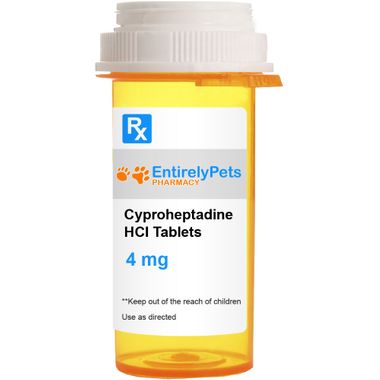SAVE 20% OFF 20% OFF Use Code PREZ20 *

Cyproheptadine for Dogs & Cats - (Generic) HCl Tablets, 4-mg, 1 tablet - [Allergy Relief]
- Description
- Directions
- FAQ
- Reviews
Description
Cyproheptadine HCI is an antihistamine prescribed to help relieve symptoms caused by seasonal, food and plant allergies, including mild and uncomplicated allergic skin reactions, such as hives or swollen tissue. This medication may also be used to help treat asthma. Customers may receive this drug under the name Periactin.
Uses
Cyproheptadine is indicated in the treatment of allergies and asthma. It can also be used to stimulate appetite.
Possible Side Effects
Instances of drowsiness and paradoxica (a symptom that causes excitement) have been reported.
Directions
Give as directed by your veterinarian. Follow the instructions printed on the prescription label. Store cyproheptadine at room temperature. Be sure to complete the prescription to ensure a full recovery, even if your pet seems to be improving, unless instructed otherwise by your veterinarian. Allow your pet access to plenty of drinking water. Cyproheptadine should be given with food.
Cautions:
Keep out of the reach of children and pets. Do not use in pets with known hypersensitivity to cyproheptadine. Cyproheptadine is not recommended for use in pregnant or lactating animals. Use with caution in animals suffering from liver disease, kidney disease, glaucoma, enlarged prostate, heart failure, or gastrointestinal or urinary tract obstructions. Cyproheptadine may interact with some other medications. Inform your veterinarian of any and all medications your pet may be taking, especially vitamins, supplements, barbiturates, tranquilizers, selegiline, furazolidone, isoniazid, or amitraz. Store at room temperature. Store protected from light and moisture.
Possible Side Effects:
Allergic reactions and serious side effects are rare, but in the case of an allergic reaction or a serious side effect seek immediate veterinary attention. Some common signs of allergic reactions and serious side effects are hives, breathing difficulty, facial swelling
Precautions:
Cyproheptadine should be used with caution in those with a history of bronchial asthma, increased intraocular (fluid in the eye) pressure, hyperthyroidism, cardiovascular disease and hypertension.
This drug is FDA-approved for human use. However, it is common practice for veterinarians to prescribe such drugs for use in dogs and cats.
Storage:
Store at room temperature. Keep this medication away from children and pets.
FAQ
- Used for the treatment of allergies and asthma in pets, where an antihistamine may be helpful
- Can be used in the management of serotonin syndrome and, in cats, as an appetite stimulant
- In horses, is used as a therapy for headshaking and Cushing's disease
Cyproheptadine is an antihistamine used in the treatment of allergies and atopy in dogs and cats. It is used primarily to treat symptomatic itching. May also be prescribed to treat asthma in cats and as an appetite stimulant. In horses, Cyproheptadine is used to treat head shaking and equine Cushing's disease, also known as pituitary pars intermedia dysfunction (PPID).
Cyproheptadine tablets are given orally. Always follow the dosage instructions provided by your veterinarian. If you have difficulty giving the medication, contact your veterinarian. Duration of treatment depends on reason for and response to treatment.
This medication should only be given to the pet for whom it was prescribed.
Talk to your veterinarian about what type of outcome is expected, and what type of exams and tests will be necessary while your pet is taking Cyproheptadine. Have your veterinarian explain the other treatment options that may be necessary to treat your pet's condition.
Tell your veterinarian if your pet has an enlarged prostate, heart disease, glaucoma, a history of urinary blockage or digestive tract blockage, or could be pregnant.
Notify your veterinarian of any other medications or supplements your pet is taking. Also tell your veterinarian if your pet has had any reactions to previous medications.
Not for use in animals hypersensitive (allergic) to it. Use with caution in animals with liver disease, kidney disease, glaucoma, enlarged prostate, severe cardiac failure, or obstruction of the urinary bladder (problems urinating), or obstruction of the pylorus (junction between the stomach and intestine).
The safety of this medication in pregnant and lactating animals (female animals nursing their young) has not been determined.
In dogs: Side effects include dry mouth, constipation, sleepiness, sedation, or increased appetite.
In cats: Side effects include dry mouth, constipation, sleepiness, sedation, or hyperexcitability (agitation). It may stimulate the appetite, and is sometimes used for this effect. Rarely you may see anemia resulting in weakness, pale gums, and lethargy. If you notice these signs, contact your veterinarian immediately.
In horses: Side effects include depression, loss of appetite, and lethargy.
Consult your veterinarian if you notice any of the above side effects. If your pet experiences an allergic reaction to the medication, signs may include facial swelling, hives, scratching, sudden onset of diarrhea, vomiting, shock, seizures, pale gums, cold limbs, or coma. If you observe any of the above signs, contact your veterinarian immediately.
Consult your veterinarian before using Cyproheptadine with vitamins, supplements, other central nervous system (CNS) depressant drugs such as barbiturates or antidepressants, monoamine oxidase inhibitors (MAOIs), such as furazolidone, selegiline (Anipryl), isoniazid, or amitraz (an ingredient in some tick collars, and in Mitaban, a treatment for mange), or flea and tick collars, since interactions may occur.
Discontinue use at least 7 days prior to skin allergy testing.
In horses, Cyproheptadine is a classified drug. Consult your veterinarian and event officials before using Cyproheptadine or any other medication in a performance horse. Not for use in horses intended for food.
Reviews
- Increased appetite. Less eye secretions.
- none


